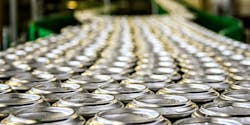Ball Corp. Announces New Aluminum Can Plant Amid Shortage
Ball Corporation announced September 2 that it would build a new aluminum beverage packaging plant in Pittston, Pennsylvania.
The new multi-line plant, expected to start production in mid-2021 and create 230 new jobs, is slated to supply a variety of beverage cans for sparkling water, spiked seltzer, beer or other carbonated beverages.
The new plant, says Daniel Fisher, Ball’s CEO of global beverage packaging, is “Ball’s latest investment to serve accelerating demand for our portfolio of infinitely recyclable aluminum containers.” Ball currently has plans for an initial investment of at least $300 million in the facility over the course of several years.
The novel coronavirus pandemic caused a dramatic shift in consumer demand for aluminum cans. Sales of kegs to restaurants and bars cratered when the businesses closed for the pandemic, and demand for canned food and six-packs shot up in response, straining the supply chains for can manufacturers like Ball and Crown Holdings, Inc.
Ball’s second-quarter earnings report, released August 6, took note of the jump: “Higher at-home consumption combined with already tight supply/demand conditions outpaced domestically produced volume,” it read, and noted that importing cans would help fill summer demand for the short term.
Ball Corp. has already added production capacity to two of its facilities in Texas and Georgia and begun construction on another plant in Glendale, Arizona; the Glendale plant is also slated to come online in 2021.
According to a statement from Ball, the site of the new plant, near Scranton, Pennsylvania, was chosen for its existing infrastructure, regional labor base, proximity to distribution routes, and cooperation from local and state officials.
Ball also cited Pennsylvania’s “focus on sustainable growth” as a point for the location. Ball and other aluminum can manufacturers have increasingly held up their recyclable metal cans as an environmentally-friendly alternative to plastic bottles.
Ball Corp. employs more than 18,300 people around the world and reported $11.5 billion in net sales last year.
About the Author
IW Staff
Find contact information for the IndustryWeek staff: Contact IndustryWeek
